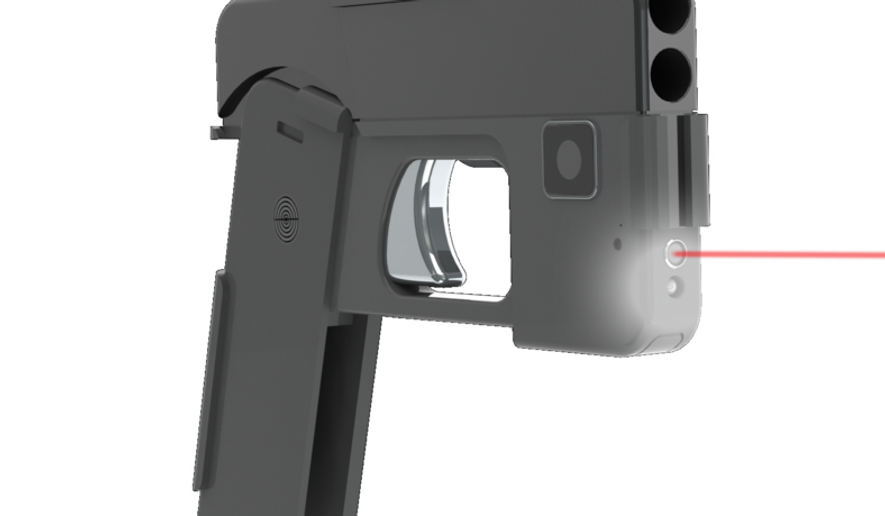A Minnesota entrepreneur plans to market a .380-caliber pistol later this year that will resemble an ordinary, pocket-size smartphone when not in use — a “virtually undetectable” weapon that has already drawn ire from top cops and anti-gun advocates.”
In today’s day and age, carrying a concealed pistol has become a necessity,” says Kirk Kjellberg on the website of his company, Ideal Conceal. “But what if you didn’t have to conceal?”
Mr. Kjellberg told NBC News this week that he was motivated by a restaurant disturbance to design a handgun that’s advertised as “Cunningly designed to look like a smartphone when folded up.”
“A boy spotted me in the restaurant and said loudly, ’Mommy, Mommy, that guy’s got a gun!’ And then pretty much the whole restaurant stared at me,” recalled Mr. Kjellberg, a Minneapolis-area businessman.
In response to that incident, Mr. Kjellberg went to the drawing board and drafted Ideal Conceal — a two-shot plastic gun that folds up to roughly 3 inches by 5 inches when it needs to be obscured. A prototype of the patent-pending pistol is expected to be ready in June, with sales planned to begin in October. However, the covert contraption already is raising concerns about the potential repercussions of lethal weapons being designed to resemble the iPhones and Androids that reside in the hands or pockets of a majority of American adults.
Mr. Kjellberg said he already had received queries from 4,000 potential customers.
“It’s extremely dangerous and would make policing even more difficult,” Lt. Bob Kroll, the president of the Police Officers Federation of Minneapolis, told The Washington Times on Wednesday.
Ladd Everitt, director of communications for the D.C.-based Coalition to Stop Gun Violence, told The Times that it was “idiotic and irresponsible” to market such a handgun. “It will also make it far more difficult for law enforcement officers to determine if they are dealing with armed individuals in the field, putting them at additional risk as they try to ensure the public’s safety,” he agreed. “But responsibility and safety clearly aren’t the focus here,” Mr. Everitt added. “Kirk Kjellberg is marketing his product to paranoid gun-toters who aren’t interested in personal accountability.
Their chief concern is to avoid detection when armed in public, which should raise immediate concerns.”
Under the U.S. Undetectable Firearms Act of 1988, gun markers are prohibited from manufacturing or selling weapons that can’t be discerned by metal detectors. Mr. Kjellberg says the Ideal Conceal will have enough metal to be UFA-compliant. He told NBC that he has already been contacted by the Department of Homeland Security and intends to supply law enforcement with X-rays so they can distinguish his firearms from mobile phones. In the line of duty, however, that ability to discern one item from another is already a matter of life or death — even before taking into account guns designed to look like cellphones.
For example, four officers with the New York Police Department shot and killed Amandou Diallo in 1999, thinking the wallet he was pulling out was a gun, and 13-year-old Tarmir Rice was slain when Cleveland cops mistook the toy gun he was brandishing for a real one.Bill Johnson, executive director and general counsel for the National Association of Police Organizations, told CNN Money that “any kind of weapon that’s disguised, so that it’s not apparent that it’s a weapon, would be cause for concern.”Mr. Everitt of the Coalition to Stop Gun Violence also said that there’s a “fascinating” cultural element to the mobile phone-modeled two-shooter.”
If gun owners now want their firearms to look like smartphones, it suggests that being seen with firearms isn’t working well for them socially,” he suggested. “Keep in mind that virtually every American now owns some type of smartphone. They’re as hip as it gets. Only one in five Americans owns a gun, however, and radical gun culture is increasingly turning off mainstream Americans.”
But even as critics complain that marketing what Mr. Kjellberg touts as a “virtually undetectable” pistol poses safety risks to civilians and cops alike, others say his claim is commercially driven. “We should note that the use of ’virtually undetectable’ in this case is for marketing purposes, and does not have any legal or literal significance. Legally undetectable guns cannot be sold to the public, and concern material properties and imaging techniques,” said Defense Distributed founder Cody Wilson, whose Texas-based organization created an international controversy in 2013 when it began freely sharing 3D-printer blueprints on the Internet for a functioning firearm. The open-source designs could be used by hobbyists to easily and affordably make their own guns, sans serial numbers, and attracted the attention of the State Department as a result.
“I have nothing but warm feelings for the company and its efforts. The gun is innovative, and I hope there’s a market for it,” Mr. Wilson told The Times on Wednesday.
• Andrew Blake can be reached at ablake@washingtontimes.com.




Please read our comment policy before commenting.